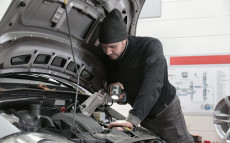- pathfindersAI
- Job Profile
Automotive Glass Installers and Repairers
Summary
Automotive Glass Installers and Repairers: A Career Overview
What They Do
The role of Automotive Glass Installers and Repairers is critically important in the automotive industry. These professionals specialize in the installation, repair, and replacement of glass components in vehicles. Automotive glass, which includes windshields, windows, and sunroofs, plays an essential role in ensuring the safety and functionality of a vehicle. The primary objective of these technicians is to restore the structural integrity of a vehicle while maintaining aesthetic standards.
Job Responsibilities
Automotive Glass Installers and Repairers have a variety of responsibilities that require both technical expertise and meticulous attention to detail. Key tasks include removing damaged glass, preparing surfaces for installation, and fitting new glass with precision. This typically involves the use of specialized tools and adhesives to ensure a proper seal. Additionally, these professionals may be required to repair small chips or cracks to prevent further damage. Other duties may involve assisting customers with insurance claims, providing cost estimates, and maintaining inventory of materials and supplies.
Essential Skills
To excel as an Automotive Glass Installer and Repairer, a unique blend of skills is essential. Manual dexterity and strong hand-eye coordination are crucial for handling delicate glass components. Furthermore, a solid understanding of vehicle structures and functions aids in identifying potential issues and ensuring proper installation. Problem-solving skills and attention to detail are necessary for diagnosing and repairing glass-related issues. Excellent customer service skills are also valuable, as these professionals frequently interact with customers to discuss repairs and provide estimates. Additionally, strong organizational abilities are required to manage multiple tasks efficiently and maintain accurate records.
Educational Pathways
While some Automotive Glass Installers and Repairers obtain positions through hands-on experience, many employers prefer candidates with formal training. Vocational schools and community colleges often offer programs that provide foundational knowledge and practical skills relevant to this career. These programs typically include coursework in automotive technology, glass repair techniques, safety protocols, and customer service. Apprenticeships or on-the-job training offer additional opportunities to gain valuable experience under the guidance of seasoned professionals. Certification from recognized organizations, such as the National Glass Association (NGA), can further enhance job prospects and validate expertise.
Career Prospects
The demand for skilled Automotive Glass Installers and Repairers remains steady, driven by the constant need for vehicle maintenance and the replacement of damaged glass. With the automotive industry continually evolving, professionals in this field have the opportunity to specialize in various areas, such as high-performance vehicles, commercial vehicles, or advanced glazing technologies. Additionally, career progression is possible with experience and further training. Experienced installers may advance to supervisory roles, manage their own glass repair shops, or transition into related fields such as auto body repair or automotive service management.
Conclusion
The career of an Automotive Glass Installer and Repairer offers a dynamic blend of technical challenges and customer interaction. With a robust set of skills, formal training, and a proactive approach to learning, individuals can build a successful career in this essential and ever-evolving field. As vehicles continue to advance in design and technology, the role of these skilled professionals remains integral to ensuring safety and quality in automotive care. For those with a keen interest in automotive work and a knack for precision, this career path promises both stability and growth.
Video
Compensation
| State | Median Salary | Median Hourly | Positions |
|---|---|---|---|
| AL | 36,880 | 17.73 | 300 |
| AK | 48,930 | 23.52 | 140 |
| AZ | 37,820 | 18.18 | 900 |
| AR | 39,550 | 19.01 | 60 |
| CA | 47,050 | 22.62 | 1,800 |
| CO | 43,380 | 20.86 | 380 |
| FL | 47,720 | 22.94 | 1,960 |
| GA | 45,360 | 21.81 | 680 |
| ID | 49,540 | 23.82 | 170 |
| IN | 42,350 | 20.36 | 250 |
| IA | 46,920 | 22.56 | 100 |
| KS | 40,710 | 19.57 | 110 |
| KY | 44,180 | 21.24 | 310 |
| LA | 32,780 | 15.76 | 550 |
| ME | 38,890 | 18.70 | 90 |
| MD | 46,720 | 22.46 | 250 |
| MA | 51,510 | 24.76 | 280 |
| MI | 48,040 | 23.10 | 390 |
| MN | 55,910 | 26.88 | 290 |
| MS | 35,220 | 16.93 | 300 |
| MO | 37,700 | 18.13 | 130 |
| MT | 39,780 | 19.12 | 100 |
| NE | 38,430 | 18.47 | 80 |
| NV | 48,250 | 23.20 | 170 |
| NH | 50,280 | 24.18 | 140 |
| NM | 36,920 | 17.75 | 100 |
| NY | 48,120 | 23.14 | 710 |
| NC | 48,780 | 23.45 | 450 |
| ND | 48,170 | 23.16 | 50 |
| OH | 49,200 | 23.65 | 500 |
| OK | 41,600 | 20.00 | 200 |
| OR | 44,500 | 21.39 | 100 |
| PA | 44,670 | 21.47 | 500 |
| SC | 39,400 | 18.94 | 240 |
| SD | 39,910 | 19.19 | 40 |
| TN | 36,120 | 17.37 | 330 |
| TX | 39,140 | 18.82 | 1,800 |
| UT | 38,370 | 18.45 | 320 |
| VA | 49,920 | 24.00 | 360 |
| WA | 48,220 | 23.18 | 520 |
| WV | 48,470 | 23.31 | 100 |
| WI | 46,090 | 22.16 | 350 |
| WY | 40,520 | 19.48 | 70 |
Similar Occupations
In this area you will find other occupations that are close to the one you were viewing in tasks, knowledge and work environment. If the primary job profile you are viewing isn't quite to your liking, take a look around and see what else is available.
Basic and Premium Accounts have more alternative occupations available than the Free account.

Automotive Body and Related Repairers - 49-3021.00
Automotive Body and Related Repairers restore the structural integrity and appearance of vehicles by repairing, replacing, and refinishing damaged car frames and body panels. They use specialized tools and techniques to bring vehicles back to their pre-accident condition, ensuring both functionality and visual appeal.
-
$48,740/yr
Median Pay -
151,910
Number of Jobs

Automotive Service Technicians and Mechanics - 49-3023.00
Automotive Service Technicians and Mechanics diagnose, maintain, and repair vehicles by inspecting and working on various components such as engines, brakes, transmissions, and electronics. They ensure automobiles are safe and efficient by conducting routine maintenance, performing complex repairs, and using specialized tools and diagnostic equipment.
-
$47,770/yr
Median Pay -
676,570
Number of Jobs